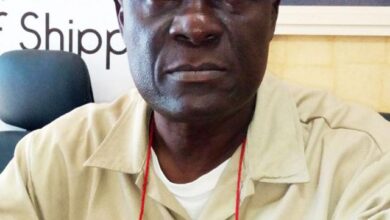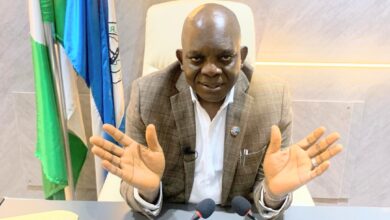How I Prioritize National Security without Missing Out On Revenue Collection – Comptroller Onyeka

Ahead of the end of year, the Tin Can Island Port Command of the Nigeria Customs Service has hit ₦1.1tr collection as at September 30, 2025
In this exclusive interview with JournalNG, Comptroller Frank Onyeka gave an insight into his strategies for outstanding results which include open door policy, sustained stakeholders’ engagement; impacts of the B’Odogwu platform on the command’s success and why he directs cargo traffic only to bonded terminals equipped for trade facilitation to avoid delays.
Onyeka, who is not the regular 9am to 5pm public servant, devotes more time to work, including on Sundays when it matters, to ensure no consignment is unduly delayed under customs control.
He spoke to Ismail Aniemu
Excerpt:
Tell us about, Tin Can Island Port Command performance in the last quarter, which is the third quarter of 2025.
On all operational fronts, revenue generation, anti-smuggling efforts, trade facilitation, protection of national interests, and stakeholder engagement.
I am pleased to report that we have achieved outstanding performance in the third quarter. Our results speak for themselves. As of the end of the third quarter, we recorded a total revenue of ₦1.1 trillion, building on the remarkable foundation laid by my predecessor. In comparison, the total revenue collected for the entire year 2024 stood at ₦1.2 trillion, which was a highly commendable achievement.
By the grace of God, with three months still remaining in the year, we have already reached ₦1.1 trillion. All things being equal, we are on course to exceed our previous benchmarks. For instance, in September 2025 alone, revenue collection stood at over ₦130 billion, representing a notable increase from ₦120 billion recorded in the same month last year. This consistent upward trajectory demonstrates our commitment to excellence and efficiency in revenue generation.
To God be the glory for these accomplishments. I must commend the exceptional officers and men of the Nigeria Customs Service with whom I work daily. The Comptroller-General of Customs (CGC), Dr. Bashir Adewale Adeniyi, has assembled a team of highly professional, diligent, and dedicated officers whose hard work and integrity continue to drive our collective success.
Their performance reflects the renewed commitment within the Service to uphold professionalism and deliver results that strengthen national revenue.
In the area of stakeholder engagement, we have taken deliberate steps to align with the CGC’s policy thrust of Consolidation, Collaboration, and Innovation.
This has encouraged us to think beyond conventional approaches and embrace innovative, result oriented strategies. One of our key differentiators is maintaining a completely open door policy that allows for continuous interaction with all categories of stakeholders.
I am always available to engage constructively and transparently with anyone who seeks to contribute to our collective objectives.
I strongly believe in hands on solution driven leadership, as exemplified by the CGC. Beyond facilitating trade, we prioritize effective communication, inclusiveness, and problem solving.
Our regular stakeholder meetings are tailored to address specific industry concerns. For instance, we recently concluded a session with clearing agents specializing in vehicle importation and are set to hold a similar engagement with agents handling general goods.
This approach has proven invaluable in building mutual understanding and sustaining operational harmony.
Our commitment to engagement goes beyond official working hours. I often remain in the office late into the evening sometimes past 10:00p.m to resolve pressing issues, either directly or through higher level interventions where necessary.
This proactive approach ensures timely decisions and reinforces confidence among our partners and stakeholders. My doors remain open at all times as we continue to pursue excellence through dedication, collaboration, and innovation in service.
Looking at the revenue once again, some of these revenues are generated from meticulous document check and demand notices. Could you give us the impact of demand notices (DN)?
I must say, and I’m telling you this for free the licensed customs agents here have been remarkably compliant. Looking at my professional trajectory, I have always been identified as a revenue officer with a firm commitment to value addition.
To the glory of God, this principle of value addition has played a significant role in my growth and achievements.
While I may not be able to provide a specific percentage at this time as I intend to compile detailed figures by the end of the year. I can confidently state that our interventions through demand notices have contributed immensely to the revenue performance we are recording today.
Give us an overview on the successes recorded using the Unified Customs Management System platform otherwise called B’Odogwu?
B’Odogwu is a game changer. As I often say, it is an innovation that has come to stay and must be encouraged. We truly have no choice in the matter because its impact speaks for itself.
To say the least, B’Odogwu has been phenomenal. It has significantly enhanced my performance and continues to prove its worth as a web-based platform that transforms how we operate within the Nigeria Customs Service.
One remarkable experience comes to mind. The CGC called me early on a Sunday morning regarding a vehicle which duty had been duly paid for and needed to be released immediately.
On the receipt of this directive from the CGC, we discovered that an intervention was required based on the declaration. Despite being a Sunday, and the OC Valuation unavailable, I promptly reached out to the Deputy Comptroller General (DCG) Tariff & Trade to explain the situation.
The DCG advised me to reach out to the Technical Supervisor (TS), who at that time was in Kwara State. When I explained the urgency to the TS, he reassured me not to worry and reminded me that since B’Odogwu is a web-based system, he can facilitate the release of the vehicle from his home and there was no need to even be in the office.
Right from Kwara, he routed the consignment back to the officer in charge who interestingly, was still at home in Apapa. That officer immediately sprang into action. He proceeded to TICT because he wanted the terminal officials on ground to facilitate the release from their end.
The only thing he requested was for me to reference the directive from the DCG, transmitted through the CAC, authorizing the release. Not long after, he confirmed that the consignment had been processed. I verified and ensured everything was properly reported to the CGC.
What could be more remarkable than that? Could we have achieved such efficiency under NICIS? Certainly not. On a Sunday, without any physical contact or manual power supply, a consignment was released seamlessly.
It demonstrated, in real time, the strength of a truly digital system. Officers could now work remotely and still maintain operational efficiency something previously unthinkable.
Now, I understand that as strong advocates of B’Odogwu, some might accuse us of bias. But the truth is, we are simply convinced of its value. Like any new system, it comes with teething problems, and that is expected.
After all, we are transitioning from a structure that has existed for nearly two decades. Naturally, some individuals who benefitted from the old order may resist change. As we push the system forward, others attempt to pull it back and that, fundamentally, is the challenge we face.
Still, B’Odogwu remains a homegrown innovation and a source of pride.
It was conceptualized, developed, and deployed by brilliant young Nigeria Customs officers, our own brothers and sisters, who used their ingenuity to bring it to life. Its success so far is undeniable. For me personally, Tin Can Island Port has exceeded all expectations. In a single day, B’Odogwu generated ₦16 billion in revenue a record breaking feat in the history of the Nigeria Customs Service at Tin Can Island Port. That, in my opinion, is nothing short of extraordinary.
As reporters with bias for business, we have interest in figures. Tell us, how have your stakeholders performed on a scale of 0 to 100, percent?
Looking at where we started, it’s important to note that when I assumed office, many stakeholders were disgruntled to trade within our space. It took deliberate effort and consistent engagement to rebuild their confidence and encourage them to return.
We had to assure them that our goal was not to frustrate trade but to ensure compliance through proper examination, which sometimes requires opening containers.
As I always emphasize, revenue generation is critical, but national security remains paramount. While we continuously assure stakeholders of our commitment to trade facilitation, I also insist that national security remains a non-negotiable priority.
Some traders initially perceived physical examination as a delay, but we made them understand that it is, in fact, a preventive measure. Once a container is properly examined and confirmed compliant, it will not be stopped again on the road and they have come to appreciate that.
Today, I can confidently say that the level of compliance has improved significantly. On a scale of 1 to 100, I would rate their performance at about 60%.
We are not yet where we want to be, but considering where we started, that 60% represents real progress and a solid foundation for greater improvement ahead.
The various trade facilitation initiatives of the service like Advance ruling, AEO, Time-Release study, One-stop Shop, look very laudable. To what extent are you replicating them here?
If you looking at my pedigree, you’ll see that these are initiatives we had at different times, and written extensively about. Thank God for the CGC we have today, who has turned those ideas into reality.
These tools and programmes have long been in the pipeline, and to the glory of God, the CGC, in his magnanimity have brought them to fruition. His leadership has provided the right environment for innovation and reform to thrive within the Service.
As far as I am concerned, these are tools we must embrace and utilize effectively particularly the one-stop shop initiative that was recently launched. When I assumed office, I made it clear to my officers that I did not want multiple alerts, as they contradict the principles of trade facilitation.
They complied, and today, multiple alerts are a thing of the past. Arbitrary interception of containers by enforcement is not part of my mandate, and it will not be tolerated under my watch.
The implementation of the one-stop shop system, therefore, aligns perfectly with the reforms I have always advocated. It has already begun to yield positive results.
What remains is for all stakeholders, customs officers, licensed agents, freight forwarders, and other partners within the port and logistics ecosystem to fully key into this process. When we all work together with sincerity of purpose, the one-stop shop will serve the collective good and further enhance efficiency, transparency, and accountability in port operations.
The service is fast gravitating towards modernization and has gone paperless already. Do you have plans for training and retraining of your officers?
We recently concluded a week long capacity building training for our officers, which ended just a few days ago. I personally delivered the first lecture on examination procedures, setting the pace for a series of impactful sessions facilitated by experts from within our ranks.
The training covered various subjects, and the feedback received was both encouraging and insightful many participants even requested more of such sessions.
The initial focus was on Assistant Comptrollers and Deputy Comptrollers, but we plan to extend subsequent phases to Chief Superintendents of Customs (CSCs) and Superintendents of Customs (SCs), who are more active on the field.
Some officers will handle direct examinations, while others will be deployed across terminals to provide real-time operational feedback. Capacity building, to me, is non-negotiable if we truly want to strengthen our performance and enhance trade facilitation.
Once we have consolidated our internal training, we intend to bring in clearing agents and other trade partners to ensure they are equally equipped with the necessary knowledge to operate effectively within the B’Odogwu system.
Most of the challenges they encounter stem from inadequate understanding of the platform, and we have already begun training some of them on how to log in and navigate it efficiently. However, training must be a continuous exercise because learning never stops.
I often remind my officers that I am still learning and asking questions myself. This spirit of continuous improvement will help us bridge existing knowledge gaps and promote seamless adoption of innovations.
Tell us about non-intrusive inspection and your preparation towards a zero human contact regime in cargo clearance.
The zero human contact regime in cargo clearance marks the next stage of development for the Nigeria Customs Service. We are steadily advancing into a fully digital era, where processes will be automated, efficient, and entirely paperless.
This transformation is not just an idea, it is a necessary evolution that everyone within the trade ecosystem must embrace. By reducing physical interaction, we are enhancing transparency, minimizing delays, and promoting a more accountable and technology driven clearance process that aligns with global best practices.
To make this vision a reality, scanners must be installed and functional in every port across the federation, and we are actively working toward that goal. Once achieved, the benefits will be far reaching: faster cargo delivery, reduced encumbrances, and improved trade facilitation. We are hopeful for the government’s continued support and approval.
There are bonded terminals on your watch that are not within this complex. How do you monitor them to achieve optimum productivity and compliance?
Compliance remains the key of efficient port operations. I have no intention of discouraging any bonded terminal operator from doing business, but it is a must that they adhere strictly to the established procedures and standards governing bonded terminal operations.
Every operator must have the right equipment, sufficient manpower, and the capacity to facilitate trade effectively. If a terminal lacks the required tools or its equipment is not in working condition, we cannot encourage such operations.
Thankfully, we have officers who are diligent, smart, and dedicated to ensuring that bonded terminals operate within acceptable standards and contribute meaningfully to our overall efficiency.
Under my watch, not all bonded terminals are functional and this is by design. Where I observe non compliance or negligence, I discourage consignments from being routed to those facilities. Some operators may be satisfied with this position, while others may not, but the reality is simple, owning a bonded terminal is not enough.
You must be ready to facilitate trade efficiently and meet operational requirements. Once your equipment is outdated, broken down, or insufficient to decongest containers effectively, you become a bottleneck in the process because efficiency cannot thrive where excuses are the order of the day.
Above all, national security remains paramount. If I am not fully convinced that your equipment is functional and your operations are secure, I will not authorize the movement of containers to your terminal.
I cannot compromise national security or transparency for convenience. Any terminal that lacks the capacity to perform efficiently will have its consignments retained at the mother port.
(Q) You have strategic partners and strategic stakeholders. I call government agencies strategic partners because you are sisters from one government. How would you rate the level of cooperation you get from sister government agencies and to what extent have their cooperation supported your success so far?
At Tin Can Island Port, all government agencies operate as a team, with the Nigeria Customs Service serving as the lead agency. Interestingly, when officials from the National Drug Law Enforcement Agency (NDLEA) visited earlier today, they referred to Customs as the “landowners,” and I reminded them that, in truth, we are all tenants working toward a common national goal.
While customs provides leadership, collaboration remains the key because, as I often say, you cannot clap with one hand; it takes two hands to clap.
I want to place on record that the level of cooperation and mutual respect among the various government agencies at Tin Can Island Port has been nothing short of outstanding. The successes we have recorded so far are the direct result of teamwork, synergy, and shared commitment to service delivery.
Earlier today, we held a productive engagement with the NDLEA, and I intend to follow up on that meeting in the coming days to strengthen our collaboration even further.
Last year, in a JournalNG exclusive interview, your predecessor told us about the possibility of achieving 24-hour port operation. Do you share in this optimism and how workable is it?
It’s good to be optimistic, but optimism must also be balanced with a sense of reality. Ideally, I would love to see a situation where we can achieve 24hour cargo clearance across all ports. While this is possible in theory, we must also ask ourselves, is it realistic at this point?
From a Customs standpoint, I can confidently say that we already operate in 24hrs. Our officers are always on duty, committed to ensuring that trade facilitation does not stop, regardless of the hour.
For instance, I recall an incident that occurred on a Sunday when one of my officers had to reach out to TICT officials from their various locations because of the urgency of a particular consignment.
We were all working remotely to ensure that the process continued smoothly. Thankfully, that clearance did not require intervention or signatures from other agencies such as the Police, NDLEA, or NAFDAC which could have delayed the release.
This example underscores that while Customs can and does operate 24 hours, the reality of achieving full round the clock operations depends on the collaboration and readiness of all sister agencies. Therefore, it’s good to remain optimistic, but we must see that optimism in practical terms.
The year is winding down and there is always a surge in importation. How prepared are you for the task of the ember months?
Experience has shown that the ember months often come with increased activity and unique operational challenges. However, we are fully ready to manage them effectively.












https://t.me/s/site_official_1win/21